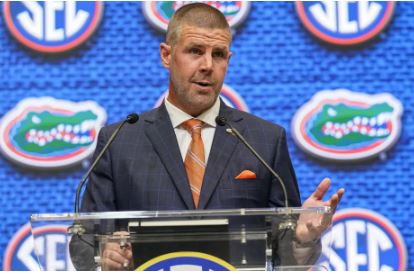Napier is going to be under pressure even before the season begins. Here’s why a comeback is possible, though.
Billy Napier, the coach of the Florida Gators, is reportedly facing pressure to leave his position.
Thanks to his 11-14 record, the nation’s hardest schedule, and win total odds of about 4½, he is a regular on hot seat lists. It is difficult to see Napier winning a fourth season if his tenure starts with a third straight losing campaign.
But what if popular belief is incorrect? In a year, how can Napier pull off a few upsets, defeat a handful of opponents, and demonstrate enough development to pique supporters’ interest in the program’s future?

With more maturity, a more seasoned quarterback, a couple of fortunate breaks, a productive offseason, and (at last) stability.
This analysis isn’t intended as a prediction either way. Rather, it’s a good-faith attempt to challenge the prevailing predictions by reverse-engineering a turnaround. If Napier rebounds in Year 3, these five reasons will be key.
Gators are veterans
Immediately after losing to Florida State, Napier sought optimism despite the challenges of inexperience.
“Look at the teams across the country that are having success,” Napier said. “They have veteran football teams, right?”
Exactly. The teams with the most returning production last year (Kansas and Missouri) were among the most improved. The third and fourth-ranked teams (FSU and Michigan) went 28-1 combined.

Florida was ranked 115th by ESPN. The Gators had seven true freshmen who played in every game, leading the nation, and their 37 starts by true/redshirt freshmen ranked fifth among power programs.
All that 2023 experience means the 2024 Florida team is now a veteran squad. The Gators have risen to 24th in returning production, with 204 more career starts and over 10,000 additional career snaps compared to last year. Given Napier’s focus on development, these stats are promising.
Players can react faster because they understand the schemes better. Coaches can highlight talent more effectively because they have a deeper knowledge of the personnel. Staff members know who to approach if there’s an issue because they’ve built relationships with players and their inner circles.
“There’s trust,” Napier said.
Trust that could finally pay off this fall.
Graham Mertz is back
Signing five-star quarterback DJ Lagway was a huge boost for the Gators’ future, but the more significant immediate move was keeping Graham Mertz.
“That’s the story of the offseason,” Napier said.

And it’s also the story of this season for several reasons.
With 43 career starts, Mertz is one of the most experienced quarterbacks in the nation. He broke UF’s single-season completion percentage record (72.9%) and had a 20:3 touchdown-to-interception ratio.
History indicates that the Wisconsin transfer will be even better in his second year. Six of last season’s top seven passers were in their second year at a new school, including the top three Heisman Trophy vote-getters (LSU’s Jayden Daniels, Washington’s Michael Penix Jr., and Oregon’s Bo Nix). Quinn Ewers was slightly lower but still led Texas to its first playoff appearance.

Mertz (2,903 yards last year) and Joe Burrow (2,894) had nearly equal throwing yards in their first year at LSU. When Burrow ran for the Heisman and the national championship the following year, he almost doubled that performance.
Mertz should still be useful to the Gators despite not quite reaching such heights because of his experience. He is more familiar with the system on the field and is able to bolster one of the SEC’s less potent passing assaults by taking more controlled chances. He’s no longer the new guy in the locker room who had to gain everyone’s respect before he could take charge off the field.
“I can now go out there and correct anything that I see that is incorrect,” Mertz remarked.
Florida’s luck should improve
Even though Florida had an unsatisfactory 5-7 record, the Gators could not have been that far from respectability.
“Even with that young roster, they gained tremendous experience and were really competitive last year,” athletic director Scott Stricklin said.

Florida was only a field goal behind LSU with 10 minutes left, nearly won at Missouri if not for a fourth-and-17 stop, and led the Seminoles midway through the fourth quarter. They lost all those games and deserved to, but they were competitive against three teams that finished in the top 12. Their luck could change, especially if you look at turnovers.
Only three teams in the nation recovered a lower percentage of opponents’ fumbles (26.7%). The national average was one interception for every 4.5 pass breakups, while Florida’s ratio was 12.3 — the worst nationally and more than twice as bad as any SEC team. During their five-game losing streak to end the season, it was even worse (18 breakups, one interception).
Coaching and effort influence these stats, but so do literal bad bounces. It’s reasonable to expect UF’s luck to improve, and maybe their final scores will, too.
Napier addressed every weakness

This offseason, the Gators weren’t naive or conceited.
In certain areas, we didn’t progress from Year 1 to Year 2, but I think we’ve made the required changes, according to Napier.
For example:
Special teams: The Gators had a strong statistical record but were tarnished by senseless mistakes (two No. 3s against Utah, a disorganized performance against Arkansas, and too many plays with insufficient players on the field).

Joe Houston was hired by Napier as a senior analyst, and the coach has commended him for his attention to detail and situational knowledge, two areas in which the Gators obviously failed. Recently, the NCAA changed its rules to permit analysts like Houston to coach players on the field—a huge benefit for Napier and his large crew.
Offensive line: An underwhelming outfit led by a pair of position coaches, despite their supposed edge. When it came to sacks and tackles for loss per game, the Gators were among the lowest 25. A strong running game and backfield were hindered by the line (which ranks 70th in the country at 4.3 yards per rush).
Florida added two tackles with starting experience (Devon Manuel of Arkansas and Brandon Crenshaw-Dickson of San Diego State) and changed one line coach. By enabling Damieon George to switch from tackle to guard (where he prefers to play), their presence further improves the interior.
Florida added two tackles with starting experience (Devon Manuel of Arkansas and Brandon Crenshaw-Dickson of San Diego State) and changed one line coach. By enabling Damieon George to switch from tackle to guard (where he prefers to play), their presence further improves the interior.

The fifth-ranked portal class in Florida also excelled on all fronts. Along with two safeties with 40 combined starts, it includes one of this cycle’s top 10 transfers at defensive line (Joey Slackman), linebacker (Grayson Howard), and cornerback (Cormani McClain and Tampa Catholic alumna Jameer Grimsley).
Though it’s difficult to separate their influence from the scoreboard, the Gators’ second-half point differential tied Auburn for third-worst in the SEC. This was due to their strength, conditioning, and diet. When Princely Umanmielen, who is currently at Mississippi, said to Inside the Gators that UF’s offseason training made them appear like “a track team,” Florida became the target of jokes.
Napier’s systems are established
When Louisiana recruited Napier in December 2017, he had no idea how much the transfer gateway, name, image, and likeness would burden the rebuilding process. He had also never guaranteed a speedy turnaround.
In May of last year, Napier stated, “You’re giving away two years of your life, to some degree.”

Whether you see that statement as an explanation or an excuse is irrelevant.
His two-year term is over.
Napier has had ample opportunity to develop a methodology for both incoming and departing transfers. The same goes for changing a program that was a laughingstock for a name, image, or resemblance.
He has enough time to improve a substandard roster (there are now just 14 Dan Mullen signees). He has plenty of time to update the player experience with better cuisine and more parking, as well as to modernize the support staff. He has ample opportunity to put all of his philosophies into practice and to examine and balance his organizational chart. In order to relieve himself of some of his personal commitments, he even had enough time to realize that he needed more time, moving Russ Callaway up to co-offensive coordinator and hiring a chief of staff.
“We’re carrying out. If that makes sense, we’re not creating,” Napier stated in May. “We’re not constructing a framework. We won’t be changing any aspect of what we do.
At last, the overhauls are finished. Napier and his team may now focus all of their efforts on completing the most important portion of the work.
winning a match. Maybe sufficient to refute common belief.

